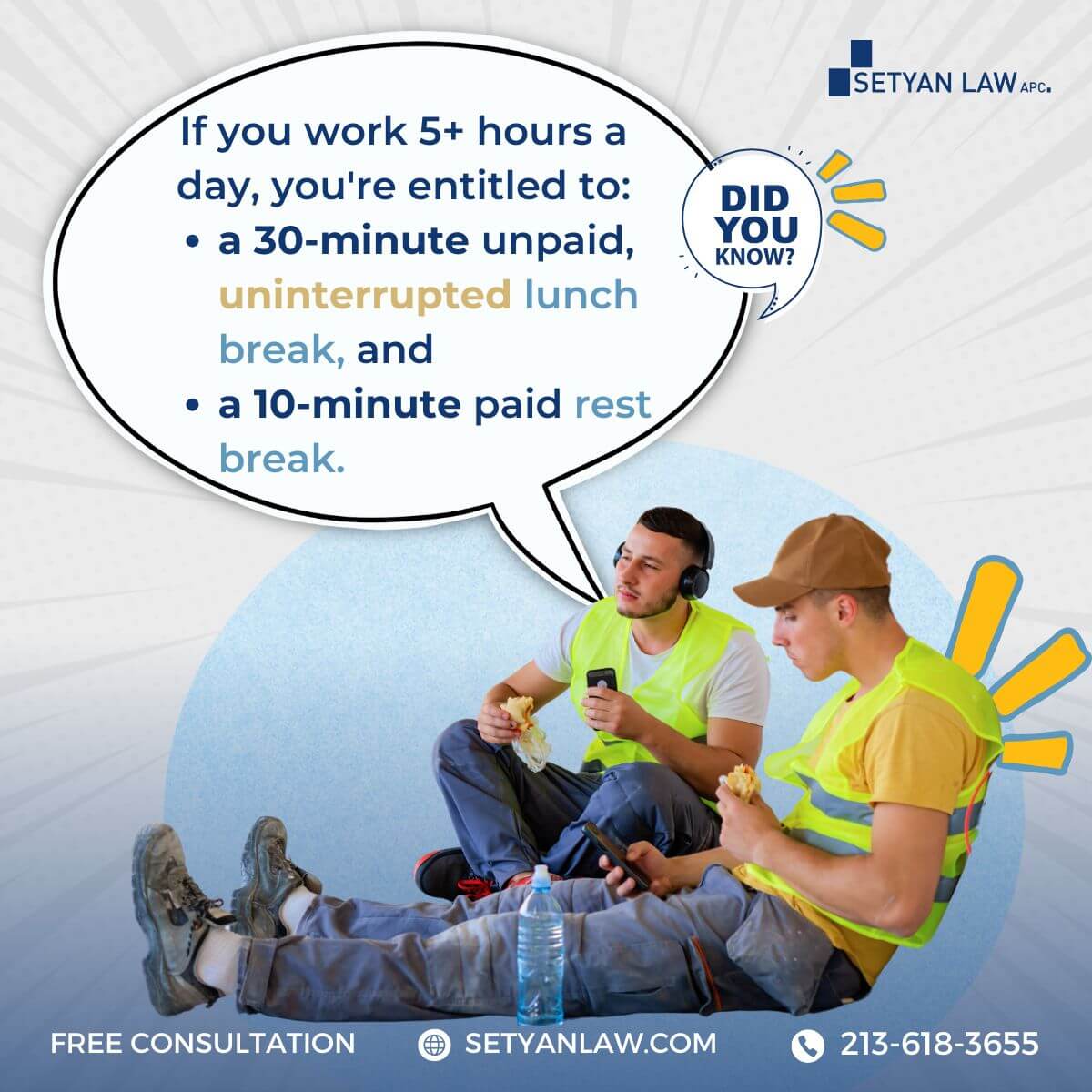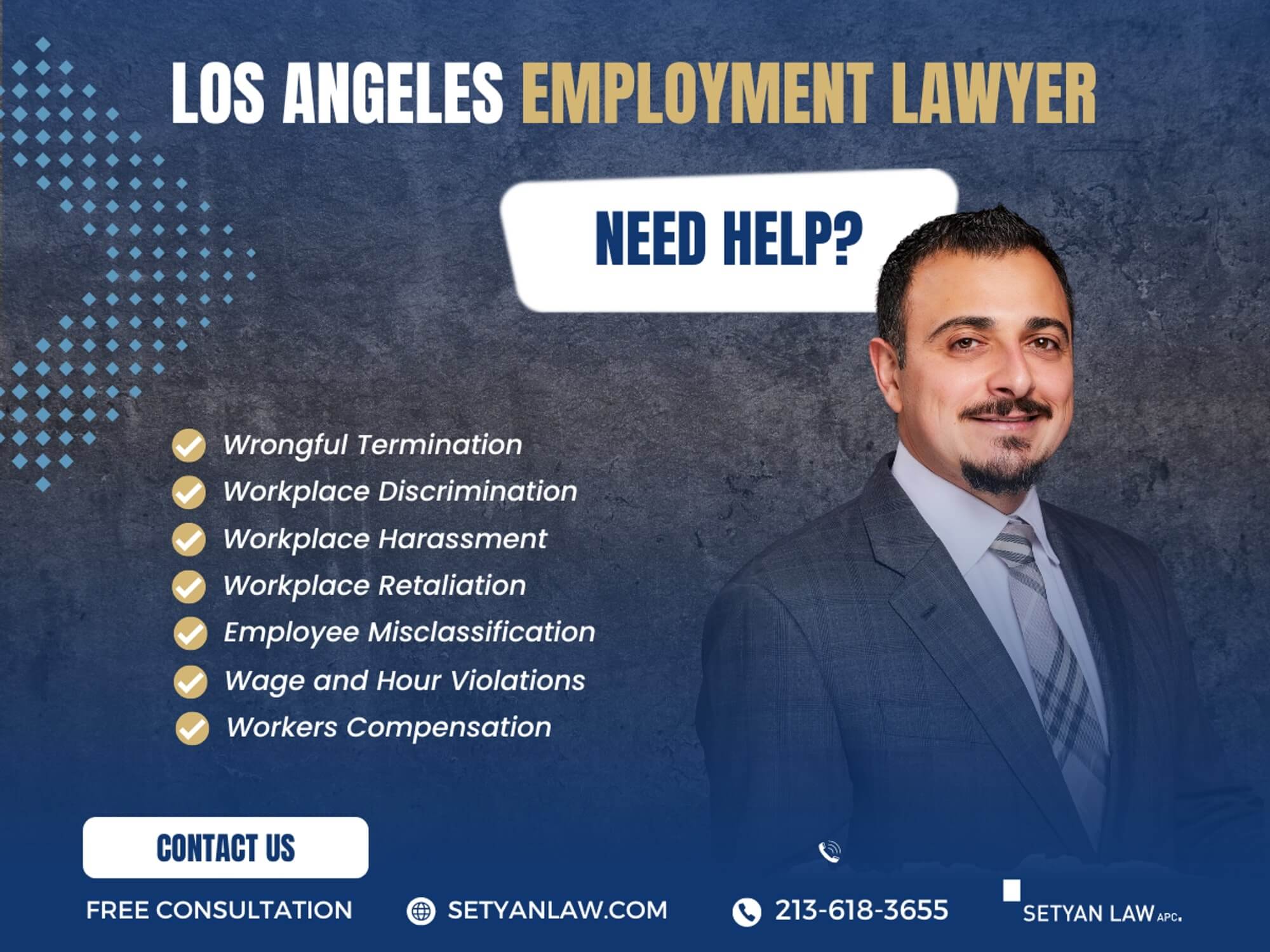Updated February 14, 2025
California Lunch Break Laws in 2025
Under California labor codes, employers are mandated to provide rest and meal breaks for nonexempt employees. These breaks ensure that employees have time to rest, rejuvenate, and have a meal during their work hours. In this comprehensive guide, we will delve into the California lunch break law, outlining the requirements for meal and rest breaks, exceptions, penalties for violations, and what employees should do if their rights are being infringed upon.
Meal Breaks:
Under the California lunch break law, nonexempt employees must be given a meal or lunch break of a minimum of 30 minutes for shifts longer than five hours. This break is unpaid and should commence before the end of the fifth hour of work. However, if the workday is not longer than six hours, this meal break can be waived. If an employee works more than ten hours in a single workday, they must receive a second 30-minute unpaid meal break. There are certain conditions under which this second meal break can be waived, such as not working for more than 12 hours that day and not waiving the first meal break.
Rest Breaks:
Rest breaks are an essential part of the California lunch break law. These breaks consist of at least ten minutes of paid rest for every four hours of work. Employees are entitled to one rest break if they work a four-hour shift and two rest breaks if they work an eight-hour shift. These breaks should ideally be taken in the middle of the four-hour period, if possible. It’s important to note that employees who work less than 3.5 hours in a workday are not entitled to rest breaks. Employers cannot require employees to combine all their breaks into one break or discourage them from taking breaks.
When Are Employees Entitled to Meal and Rest Breaks?
Most nonexempt employees, those who earn weekly wages, are entitled to meal and rest breaks under the California lunch break law. Exempt employees, on the other hand, are only entitled to meal breaks but not rest breaks. Exempt employees generally meet certain requirements such as earning a monthly salary at least twice the minimum wage for full-time employment and having job duties that require regular use of discretion and independent judgment. More than half of their work should be administrative, managerial, professional, or executive in nature. However, there are exceptions and different break laws for certain categories of workers, such as domestic employees, farm employees, and independent contractors.
Exceptions to California Break Rules
While most employees are covered by the California lunch break law, there are exceptions and exemptions for certain industries and occupations. The following industries have specific break rules or exemptions in place:
- Construction
- Commercial drivers
- Security officers
- Movies and motion pictures
- Electrical or gas companies
It’s important to note that these exceptions may vary depending on the exact nature of the work and specific agreements or bargaining agreements in place within the industry.
What Constitutes a Valid Meal or Rest Break?
For a meal or rest break to be considered valid under the California lunch break law, certain conditions must be met. These conditions ensure that employees are truly able to take a break and are not burdened with work responsibilities during that time. A valid meal or rest break:
- Should be uninterrupted
- Must relieve the employee of all work duties
- Allows the employee the ability to leave the worksite for meal breaks
- Should not be discouraged or prevented by the employer
Employers cannot require employees to work during their breaks or remain “on-call.” On-duty meals are only necessary in certain industries where the nature of the work requires it, and employees must be compensated for that time. Employees have the right to take breaks and choose whether or not to do work on those breaks.
Penalties for Violating California Lunch Break Law
Employers who violate the California lunch break law may face penalties and be held liable for damages. The penalties include paying one hour’s wages for each day a rest break is not given and an additional hour’s wages for each day a meal break is not given. If an employer consistently fails to provide any breaks at all, employees may be entitled to collect up to two days’ worth of wages for every workday for the past three years. Employees who have been denied breaks or have experienced discouragement from taking breaks can file a claim against their employer with the help of an experienced employment lawyer.
Employee Rights and Actions to Take
If an employee believes their employer is violating the California lunch break law, it is important to take action to protect their rights. Employees can consult with an experienced employment lawyer who can review the specifics of their case and advise them on the best course of action. Filing a claim against the employer can help employees recover unpaid wages, penalties, and potentially even attorney’s fees and costs. It’s crucial to act within the specified time limits for filing a claim, so seeking legal counsel as soon as possible is recommended.
Frequently Asked Questions
Can an Employee Choose Not to Take a Lunch Break in California?
In certain circumstances, employees can choose to waive their meal break if they work a job that is at most six hours in duration and they and their employer agree to waive the break. However, if the employee works more than ten hours in a single day, they must still receive a second meal break.
What Are the Penalties for Employers Who Violate the California Lunch Break Law?
Employers who violate the California lunch break law may be required to pay damages, including unpaid wages and liquidated damages equal to the unpaid wages. Additionally, employees who prevail in a lawsuit against their employer for violating the lunch break law may recover their attorneys’ fees and costs.
What Should I Do if My Employer Violates the California Lunch Break Law?
If you believe your employer is violating the California lunch break law, it is advisable to consult with an experienced employment lawyer. They can evaluate your case, advise you on your legal options, and help you pursue a claim against your employer if necessary.
Is It Possible to Receive Overtime Pay if I Work Through my Lunch Break?
Under the California lunch break law, employees who work more than eight hours in a day or 40 hours in a week may be entitled to overtime pay for any hours worked over the respective threshold. Employees should consult an employment lawyer if they believe they have not received the appropriate wages for their work.
Overview of California Lunch Break Laws
California employers face over $100 million annually in break violation penalties. Most violations occur because employees and employers lack clear understanding of their rights and obligations.
Pursuant to California Labor Laws, any employee who works for more than five hours is entitled to an unpaid, off-duty, uninterrupted meal period of at least 30 minutes. As long as the employee does not work more than six hours in the workday, they can waive the meal period by mutual consent of the employee and employer.
If an employee works more than 10 hours, they must be allowed a second meal break of no fewer than 30 minutes. This second break can be waived if the total hours in the workday do not exceed 12, both parties mutually consent, and the first meal break was not waived.
There are certain situations when on-duty, paid meal breaks may be allowed. For example, if the nature of the work prevents the employee from being relieved of all duty and both parties agree in writing, then the meal break may be on-duty. This arrangement can be revoked at any time in writing by the employee.
Meal Break Requirements in California
You have a right to a 30-minute uninterrupted meal break when working more than 5 hours in a day. This break must begin before your fifth hour of work ends. For example, starting work at 8:00 AM requires beginning your meal break before 1:00 PM.
Additional meal break requirements apply for longer shifts:
- Second 30-minute meal break required after 10 hours of work
- Option to waive second meal break if:
- Total workday doesn’t exceed 12 hours
- You took your first meal break
- Both parties mutually consent
Rest Break Obligations in California
Your right to 10-minute paid rest break follows different timing requirements. For every four hours worked “or major fraction thereof,” employers must provide one paid rest break. This means:
- One 10-minute break for 3.5 – 6 hours worked
- Two 10-minute breaks for 6.1 – 10 hours worked
- Three 10-minute breaks for 10.1 – 14 hours worked
Rest breaks should occur in the middle of each work period when practical. Unlike meal breaks, employers must provide paid rest periods.
Understanding Break Requirements and Violations
Key differences between meal and rest breaks include:
| Aspect | Meal Breaks | Rest Breaks |
|---|---|---|
| Duration | 30 minutes | 10 minutes |
| Payment | Unpaid | Paid |
| Timing | Before end of 5th hour | Middle of work period |
| Location | Can leave premises | Can leave premises |
| Waiver Rules | Can waive if shift ≤ 6 hours | Cannot be waived |
Employers violating these requirements must pay one additional hour of regular pay for each day with a meal break violation, and another hour for each day with a rest break violation.
An important California court case called Brinker Restaurant Corp. v. Superior Court ruled that employers must provide breaks but aren’t required to police them to ensure no work occurs. However, employers must:
- Relieve employees of all duties
- Relinquish control over activities
- Provide genuine break opportunities
If your employer denies proper meal or rest breaks, Setyan Law can evaluate your case and explain your rights. Our employment lawyers understand these complex requirements and fight to protect your workplace rights.
Common Break Violations and Your Right to Compensation
Employees who work a certain number of hours in a workday are entitled to meal and rest breaks. This time off is necessary to recoup and regenerate so that you can provide the best service possible when you return.
There are few exceptions to these laws. If your employer is not providing you with the opportunity to take breaks or isn’t paying you properly, Setyan Law can evaluate your case and explain your rights.
Types of Break Violations
The California Supreme Court explicitly prohibits employers from requiring employees to remain on-call during rest breaks. Common violations include:
- Interrupting breaks for work duties
- Missing required break timeframes
- Providing shorter breaks than legally required
- Pressuring employees to skip breaks
- Failing to relieve employees of all duties
Premium Pay Requirements and Penalties
California law entitles you to one additional hour of pay at your regular rate when break violations occur. If both meal and rest break violations happen on the same day, you can receive up to two hours of premium pay.
Employers face substantial penalties:
- $50 per first-time violation
- $100 for subsequent violations
- Additional civil penalties for willful violations
Filing Break Violation Claims
You have three years to file a claim after a break violation occurs. The California Supreme Court established this three-year statute of limitations in the Murphy v. Cole case.
Protect your rights by documenting:
- Dates and times of missed breaks
- Reasons for missed breaks
- Break-related communications
- Wage statements
Your premium pay calculation must include your “regular rate of pay,” covering base wages plus non-discretionary bonuses and commissions. This ensures full compensation for break violations.
An important California court case called Brinker Restaurant Corp. v. Superior Court ruled that while employers must provide breaks, they aren’t required to police them. However, employers must create an environment that allows genuine opportunities for uninterrupted breaks.
If your employer violates meal or rest break requirements, Setyan Law has a team of employment lawyers in California who can evaluate your case. We will review your documentation, gather evidence to support your claims, and fight for the compensation you deserve. Call us for a free consultation at (213) 618-3655.
Special Circumstances and Break Waivers Under California Law
Pursuant to California Labor Laws, certain workplace situations allow modifications to standard break requirements. Understanding these exceptions helps protect your rights while maintaining workplace efficiency. If your employer improperly applies these exceptions, a California employment lawyer at Setyan Law can evaluate your situation.
Meal Break Waiver Requirements
California law permits meal break waivers under specific conditions. For shifts six hours or less, you can waive your meal break through mutual agreement with your employer. Second meal break waivers require:
- Total workday not exceeding 12 hours
- First meal break taken as required
- Written agreement between you and employer
On-Duty Meal Break Agreements
There are certain situations when on-duty, paid meal breaks may be allowed. These agreements must meet strict requirements:
| Requirement | Details |
|---|---|
| Nature of Work | Must prevent relief from all duties |
| Agreement | Written agreement between employer and employee |
| Payment | Must be paid at regular rate |
| Revocation | Can be revoked in writing at any time |
The California Labor Commissioner recognizes specific positions qualifying for on-duty meal breaks, such as sole workers in coffee kiosks or security guards at remote locations.
Remote Work Break Requirements
Remote work arrangements do not diminish your break rights. Employers must:
- Provide uninterrupted meal breaks within first five hours
- Ensure 10-minute rest breaks for every four hours worked
- Maintain accurate time and break records
An important California court case called Brinker Restaurant Corp. v. Superior Court established that employers must implement reliable systems for monitoring remote work hours and break compliance. While employers aren’t required to police breaks, they must create an environment supporting proper break periods.
If your employer misapplies these special circumstances or denies proper breaks, Setyan Law has a team of employment lawyers in California who understand these complex requirements. We will review your case and fight for your workplace rights. Call us for a free consultation at (213) 618-3655.
Industry-Specific Break Requirements in California
Your right to meal and rest breaks remains protected even in industries with special operational needs. Employment disputes involving industry-specific break rules often impact your livelihood and require expert legal guidance to navigate properly.
Healthcare Worker Break Provisions
Healthcare facilities face unique challenges balancing patient care with employee break rights. Under IWC Order 5-2001, healthcare workers operate under modified break rules:
| Standard Rule | Healthcare Exception |
|---|---|
| Uninterrupted breaks | Can be interrupted for patient care |
| Fixed timing | Flexible scheduling allowed |
| Must leave work area | Can remain in facility |
Transportation Industry Requirements
Federal regulations now preempt California’s standard break rules for interstate truck drivers. These requirements include:
- Federal hours-of-service rules replace state requirements
- One 30-minute break required per 8 hours of driving
- Applies to both short-haul and long-haul operations
Special Industry Variations
Motion Picture Industry workers have distinct break patterns:
- Up to 6 hours of work before first meal break
- Subsequent meal periods within 6 hours of previous break
Construction and Mining operations allow:
- Staggered rest periods for continuous operations
- Breaks coinciding with natural work stoppages
- Premium pay for missed break periods
Petroleum facility workers in safety-sensitive positions may remain on-call during rest periods. These workers receive additional compensation for maintaining availability during breaks.
If your employer improperly applies these industry exemptions, Setyan Law has a team of employment lawyers in California who understand these complex requirements. We will review your case, gather evidence to support your claims, and fight for the justice you deserve. Call us for a free consultation at (213) 618-3655.
Remember, industry exemptions modify break timing and conditions – they don’t eliminate your fundamental right to rest periods. Each variation aims to balance operational needs with essential worker protections under California law.
Whose Responsibility Is It to Make Sure Employees Get Meal and Rest Breaks?
An employer must provide an opportunity for meal and rest breaks to employees; however, an important California court case called Brinker Restaurant Corp. v. Superior Court ultimately ruled that the employer does not have to police meal breaks to ensure on work is being done.
The employer satisfies their legal obligation in providing off duty breaks as long as it:
- Relieves the employee of all duties
- Relinquishes control over the employee’s activities
- Allows the employee a reasonable opportunity to take the break
- Does not impede or discourage the employee from taking the break
Protecting Your Break Rights Under California Law
Employment disputes involving break violations impact your livelihood and future. If your employer denies proper breaks or retaliates against you for exercising these rights, a California employment lawyer at Setyan Law can help protect your interests.
Documentation Requirements
The Labor Commissioner’s Office recommends maintaining comprehensive records of break violations:
| What to Document | Details to Include |
|---|---|
| Break Times | Start and end times of each break |
| Missed Breaks | Date and reason for missing break |
| Communications | Emails or messages about breaks |
| Witness Information | Names of coworkers present |
| Premium Pay | Whether received for violations |
Filing Break Violation Claims
Pursuant to California Labor Laws, you must file break violation complaints with the Labor Commissioner’s Office within three years. The Division of Labor Standards Enforcement (DLSE) handles these claims.
Required steps for filing include:
- Submitting the Report of Labor Law Violation form
- Including copies of supporting documentation
- Providing detailed violation information
- Preparing for potential investigations
The Labor Commissioner holds authority to issue citations requiring wage payment and civil penalties for violations.
Protection From Employer Retaliation
California law strictly prohibits retaliation against employees exercising break rights. Recent legislation creates a rebuttable presumption of retaliation for adverse actions within 90 days of exercising these rights.
If you face retaliation, you can:
- File a complaint with the Retaliation Complaint Investigation Unit
- Present evidence of protected activity and adverse action
- Request formal investigation
The Labor Commissioner may order:
- Job reinstatement
- Lost wage payment with interest
- Personnel file correction
- Civil penalties up to $10,000 per violation
Remember, the Labor Commissioner’s Office accepts complaints regardless of immigration status and provides language interpreters when needed. Setyan Law has a team of employment lawyers in California who understand these complex requirements. We will review your case, gather evidence to support your claims, and fight for the justice you deserve. Call us for a free consultation at (213) 618-3655.
Protecting Your Workplace Rights in California
You have a right to meal and rest breaks while you work. California’s break laws provide essential protections affecting millions of workers daily. Employment disputes involving these rights often impact your livelihood and can affect your entire life.
Understanding your break rights makes a significant difference. Premium pay requirements, strict timing rules, and industry-specific exemptions create a complex framework demanding careful attention. Many employees lose thousands in unpaid wages simply because they remain unaware of these fundamental workplace rights.
Proper documentation protects your interests when violations occur. Detailed records of missed breaks, wage statements, and workplace communications provide crucial evidence for recovering deserved compensation. Swift action within legal deadlines ensures protection of your rights under California law.
Setyan Law has a team of employment lawyers in California who understand these complex requirements. Our knowledgeable attorneys have handled hundreds of employment law cases like yours. We will:
- Review your documentation
- Gather evidence supporting your claims
- Fight for the justice you deserve
- Protect your workplace rights
Employment disputes are about more than winning. They often involve your livelihood and can impact your entire life. Call Setyan Law for a free case evaluation at (213) 618-3655. No fee until you win.
FAQs
For an 8-hour shift in California, you’re entitled to one unpaid 30-minute meal break and two paid 10-minute rest breaks. The meal break should be taken before the end of your fifth hour of work.
While you’re allowed to skip a rest break, your employer cannot require or encourage you to do so. If you work at least 3.5 hours, you’re entitled to a 10-minute paid rest break, which should be uninterrupted.
California law requires employers to provide a 30-minute unpaid meal break for every 5 hours worked. This break must be uninterrupted and duty-free, allowing you to be completely relieved of all work responsibilities.
For shifts longer than 10 hours, you’re entitled to a second 30-minute meal break. However, you can waive this second meal break if your total workday isn’t more than 12 hours and you took your first meal break.
If your employer violates break laws, document the incidents in detail. You can file a complaint with the Labor Commissioner’s Office within three years of the violation. Remember, it’s illegal for your employer to retaliate against you for exercising your break rights or filing a complaint.
You have a right to meal and rest breaks while you work. If your employer is denying you lunch breaks or rest periods, a California employment lawyer at Setyan Law can help. Understanding and enforcing your workplace rights is crucial for maintaining a healthy work-life balance and ensuring fair treatment at work. California labor laws regarding rest and meal breaks are among the most comprehensive in the nation, designed to protect workers’ well-being and productivity. Employees who work a certain number of hours in a workday are entitled to meal and rest breaks, which are fundamental rights protected by state law. This time off is necessary to recoup and regenerate so that you can provide the best service possible when you return to your duties. While there are few exceptions to these laws, they are strictly enforced to maintain workplace fairness and employee health. If your employer is not providing you with the opportunity to take breaks or isn’t paying you properly, Setyan Law can evaluate your case, explain your rights, and help you pursue appropriate legal action.
Meal Break Requirements in California
Pursuant to California Labor Laws, any employee who works for more than five hours is entitled to an unpaid, off-duty, uninterrupted meal period of at least 30 minutes. This mandatory break ensures workers have adequate time to rest, eat, and attend to personal needs during their workday. As long as the employee does not work more than six hours in the workday, they can waive the meal period by mutual consent of the employee and employer. However, this waiver must be voluntary and cannot be coerced or pressured by the employer.
If an employee works more than 10 hours, they must be allowed a second meal break of no fewer than 30 minutes. This second break can be waived if the total hours in the workday do not exceed 12, both parties mutually consent, and the first meal break was not waived. This provision recognizes the additional physical and mental demands placed on employees during extended shifts and ensures proper rest and nutrition during longer workdays.
There are certain situations when on-duty, paid meal breaks may be allowed. For example, if the nature of the work prevents the employee from being relieved of all duty and both parties agree in writing, then the meal break may be on-duty. This arrangement can be revoked at any time in writing by the employee. Such situations might include security guards monitoring a facility or healthcare workers attending to patient needs.
Rest Break Obligations in California
Employees who work at least 3.5 hours per day are entitled to uninterrupted rest breaks as well. One 10-minute rest break must be offered for every four hours worked, or major fraction thereof. The rest break should be in the middle of each four-hour work period to maximize its effectiveness and provide consistent periods of rest throughout the workday. Thus, in an eight-hour workday, one rest break falls on either side of the normal mandated 30-minute meal break, creating a balanced schedule that promotes worker well-being. Employers are allowed to deviate from this when practical considerations make it infeasible, but such deviations should be reasonable and justified. Similar to meal breaks, an employee working a 12-hour shift must take at least three uninterrupted ten-minute rest breaks to maintain alertness and prevent fatigue.
Whose Responsibility Is It to Make Sure Employees Get Meal and Rest Breaks?
An employer must provide an opportunity for meal and rest breaks to employees; however, an important California court case called Brinker Restaurant Corp. v. Superior Court ultimately ruled that the employer does not have to police meal breaks to ensure work is being done. This landmark decision clarified the scope of employer obligations while maintaining worker protections.
The employer satisfies their legal obligation in providing off-duty breaks as long as it:
- Relieves the employee of all duties, ensuring complete freedom from work responsibilities
- Relinquishes control over the employee’s activities during the break period
- Allows the employee a reasonable opportunity to take the break without interference
- Does not impede or discourage the employee from taking the break through direct or indirect means
How an Employment Attorney in California Can Help You
If you have not been given appropriate meal or rest breaks at work, you have a right to compensation for unpaid wages. Additionally, your employer may face fines for violations of the law. Setyan Law has a team of employment lawyers in California who can answer your questions about meal and rest break requirements.
Don’t hesitate to reach out for a free, confidential consultation about your rights. We’re here to help you navigate the legal process and fight for fair treatment in your workplace.
Conclusion
Understanding the California lunch break law is essential for both employees and employers. Employees have the right to rest and meal breaks, and employers must comply with the law to avoid penalties and legal action. If an employee believes their rights are being violated, consulting with an experienced employment lawyer is crucial to seek appropriate remedies. By upholding the California lunch break law, employees can ensure they receive the necessary breaks to maintain their well-being and productivity in the workplace.
Consulting a Los Angeles employment attorney will provide you with the necessary guidance and support to navigate the legal process effectively. If you’ve been denied your rights as an employee by your employer, time is of the essence, please seek legal advice promptly to maximize your chances of a successful outcome.
Call Setyan Law at (213)-618-3655 for a consultation.







